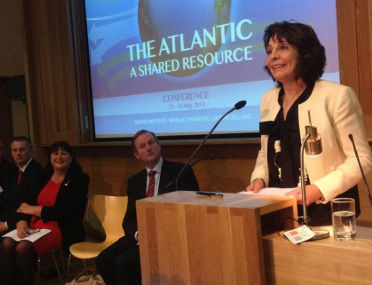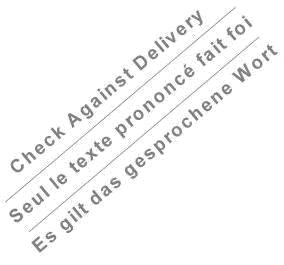Atlantic, a shared resource

Speech at the Marine Institute in Galway, Ireland - Commissioner Damanaki delivered a speech at the Marine Institute in Galway, in the framework of the signing of the Joint Statement on Atlantic Ocean Cooperation, lauching a Transatlantic Research Alliance between the EU, the US and Canada.

Prime Minister Kenny, Ministers, ladies and gentlemen,
Thank you for inviting me to participate in this event and giving me the chance to say a few words on the Atlantic and its potential as a shared resource.
The size and strong tides of the Atlantic have captured the minds of many Europeans throughout time. It has shaped our continent's history and identity. Great explorers like St Brendan, Christopher Columbus and Vasco da Gama set sail from its ports to discover new places. The sea, as Christopher Columbus said referring to the Atlantic, was to grant each man new hope.
Today, we continue to look at the Atlantic in the same way - in search of 'new hope'. But though our aim remains the same of those of past explorers, several factors evolved through time which can able us to identify and unleash the true potential of this great ocean. Today we have the knowledge through research and technology, unlike Columbus, to anticipate that if we set off for the New World, we will land in America and not the Indies.
Technological advances in fields such as robotics, acoustics, knowledge of materials and communications give us now the opportunity to see what the 71% of this planet can provide. This is the point covered by the Statement. In other words, today we have the means to identify the potential and opportunities that exist in the Atlantic Ocean. So we are here to unleash them. By driving forward the "Blue Economy", we can have about 7 million jobs in European maritime sector by 2020.
However, there is no one size fits all approach. Each sea-basin, as is the case of the Atlantic, has its different characteristics and requires a specific combination of measures to unlock its potential.
Towards this, in November 2011, we created the Atlantic Forum to identify the challenges and opportunities in the region and take stock of existing initiatives that can support growth and job creation. Our Atlantic Forum gathered together representatives and stakeholders from the Atlantic Member States – Spain, Portugal, France, Ireland and the United Kingdom. We spoke to national and local authorities who defined their priorities. Scientists indicated avenues of research in areas varying from wave energy to marine-based pharmaceuticals. The industry helped us identify what education, training and skills will be needed in this process.
I have been here in Galway a year ago and was extremely impressed with the way Irish research programmes are creating fertile conditions for growth and jobs. Graduate students' projects involve industrial partners. Large multinational and small three-person start-ups are participating in joint initiatives such as SmartBay. And I found similar demand for innovation when I visited Vigo, Lisbon, Aberdeen or Brest.
Building on this impressive momentum, at the level of the Commission, together with my colleague Commissioner Geoghegan-Quinn and her team, we pushed blue growth high up the list of priorities in the research programme. Commissioner Hahn's team did the same for regional funding. A dynamic Atlantic strategy was gradually being formed.
Based on this work, just over a week ago we adopted an action Plan for the Atlantic. This Action Plan sets out concrete actions that we believe can provide the additional push for the Atlantic to show its undoubted potential. Saying this, the environmental and ecological stability of the Atlantic Ocean lies at the heart of our Action Plan.
So, what does this Action Plan entails?
Firstly, we want to develop offshore renewables. The strong Atlantic tides that so surprised the Ancient Greek navigator Pytheas on his famous voyage three hundred years before Christ can deliver clean and reliable energy. The massive expansion if wind power, that is already planned, will transform our seas.
Secondly, we need to improve education and training in traditional and emerging maritime sectors.
Thirdly, we want to focus on a more active and sustainable increase in our production from fish farms by 2020, in order to increase the part of aquaculture fish consumption that is produced in Europe.
Finally, we want to extend cooperation in oceanographic research. Improving knowledge of the Atlantic through seabed mapping, will deliver a significant contribution of the objectives of the Plan.
Lack of knowledge of the topography, sediments and marine-life on the sea floor is a disincentive for investment by the small and medium enterprises engaged in aquaculture. It adds to the cost and time needed to grant licences for new renewable energy installations and it leaves local authorities uncertain as how to best protect their coastlines against erosion.
Through our “marine knowledge 2020” initiative we are working to improve matters.
The first phase is complete. Data from 480 fixed ocean monitoring stations measuring currents, temperature, salinity, sea-level and wave height are now available on line almost as soon as they are measured, through one internet site.
Currently more than 100 European organisations- research institutes, geological surveys, hydrological projects- are working together to produce a map of European waters. This will be freely available to all users – public or private by the end of 2014. Not only will this enable better access to information and lower the cost of existing activities. We believe it will stimulate new innovative products and services.
Some actions proposed in the Action Plan can be implemented through European instruments for research or territorial cooperation. Others can be undertaken by individual member states. And the Commission will back this up with an assistance mechanism that will enable those who believe they can contribute to find partners and finance- from the EU programme, from national resources, from the European Investment Bank and from the private sector.
Prime Minister, Ministers, Ladies and Gentlemen,
In the same way, besides technological advancements we also have another important advantage today-that is, international cooperation.
The Atlantic Ocean is a shared resource. It is vital that we combine our efforts and knowledge with this of our transatlantic partners.
To this end, following the orientations of our Atlantic Strategy, we will move on to a next stage of cooperation today with the signing of the "Galway Statement on Atlantic Ocean Cooperation".
This joint Declaration with our American and Canadian partners will facilitate the management of international waters and provide a single set of standards. And it will contribute to the work of the international seabed authority which has already signed contracts for exploration of the mid-Atlantic ridge for poly metallic sulphides.
I am grateful to the Irish Presidency for setting the ball rolling with the joint Declaration.
It is an excellent stepping stone that I believe may lead in due time to an even wider agreement.


